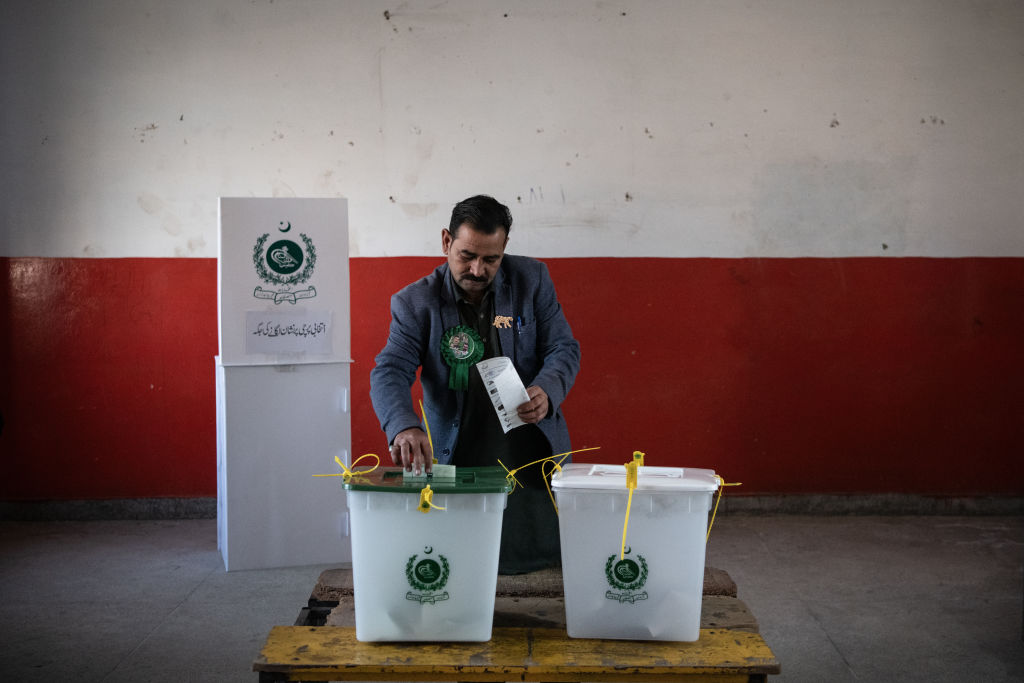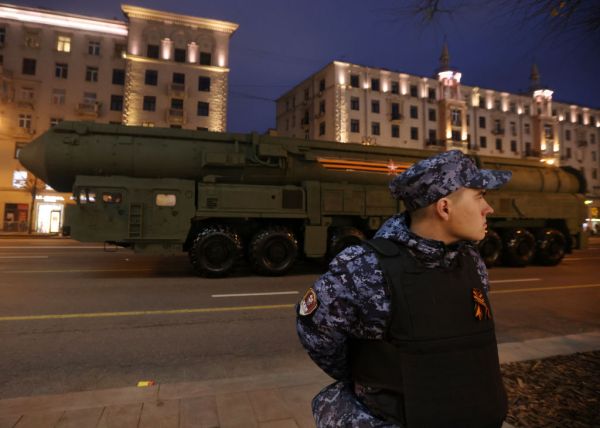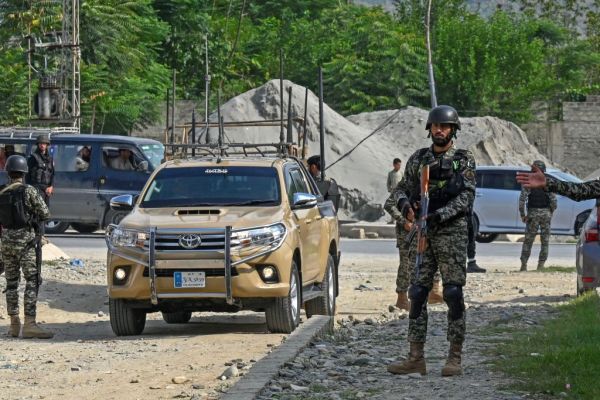Happy Thursday! The New Yorker profiled our own Advisory Opinions podcast, concluding that, “in an era of aggrieved political discourse, [Sarah] Isgur is something unusual: a commentator who truly seems to love the government institution she covers.”
Jonah and Steve spent much of their time yesterday working the phones, desperately trying to get similar writeups of their own “flagship” podcasts. Maybe Egghead Monthly will bite.
Quick Hits: Today’s Top Stories
- Israeli Prime Minister Benjamin Netanyahu on Wednesday rejected Hamas’ proposed ceasefire agreement and hostage-release proposal—drawn up at the request of Qatari and Egyptian mediators—dismissing the plan as “delusional.” Under the Hamas proposal presented to Israel on Tuesday, the terrorist organization would return all of the estimated 136 hostages held in Gaza—a fifth of whom are believed by Israeli officials to be dead—in a phased release. In exchange, Hamas demanded the freeing of hundreds of Palestinian prisoners, including senior members of the terrorist organization, and a permanent ceasefire to end the war—a provision which would have functionally allowed Hamas to remain in power in Gaza following an Israeli withdrawal from the enclave. Netanyahu promised Israel was on its way to “absolute victory” in its war against Hamas, but did not close the door on continued negotiations.
- U.S. Central Command (CENTCOM) announced on Wednesday that the U.S. military had launched a unilateral drone strike on a vehicle in eastern Baghdad, Iraq, which killed a commander of Kata’ib Hezbollah, the Iranian-backed militia the U.S. intelligence community has said is responsible for the attack on Tower 22 in Jordan late last month that killed three U.S. service members and injured dozens of others. The commander, CENTCOM said, was “responsible for directly planning and participating in attacks on U.S. forces in the region,” adding that “there are no indications of collateral damage or civilian casualties at this time.” Kata’ib Hezbollah later reported that the blast had killed Abu Baqir Al-Saadi, the commander in charge of its Syria operations.
- More than 150 people have been arrested in Senegal since Monday as part of ongoing protests over President Macky Sall’s move to delay presidential elections originally set for later this month, with demonstrators raising concerns over alleged corruption in the candidate selection process. On Monday, the Senegalese parliament voted to postpone the election until December, functionally extending Sall’s second term as leader of the West African country generally considered a stable democracy in a turbulent region. Sall has said he will not seek a third term—from which he is constitutionally barred—but opponents have called the election maneuver a “constitutional coup.”
- U.S. and allied intelligence agencies released a statement on Wednesday warning of a Chinese hacking campaign against U.S. critical infrastructure and encouraging managers of those IT systems to attempt to mitigate the risk of an attack. Chinese state-sponsored hackers have had access to some U.S. infrastructure systems for as long as five years, the report said, in order “to pre-position themselves on IT networks for disruptive or destructive cyberattacks against U.S. critical infrastructure in the event of a major crisis or conflict with the United States.”
- The U.S. military’s North American Aerospace Defense Command (NORAD) said Tuesday that it had “detected and tracked four Russian military aircraft operating in the Alaska Air Defense Identification Zone (ADIZ),” which stretches 150 miles off the Alaskan coastline. The Russian planes never entered U.S. or Canadian airspace, NORAD said, adding that there is often Russian activity in the region that is not considered threatening.
- Five U.S. Marines are missing after the helicopter they were flying was found 35 miles east of San Diego, California, on Wednesday morning. The CH-53E Super Stallion helicopter the marines were in took off from Creech Air Force Base Tuesday night for a routine training flight but was reported “overdue” Tuesday night for its arrival at Marine Corps Air Station Miramar in California. Local authorities found the aircraft in rough terrain on Wednesday morning, though it’s not yet clear why the helicopter went down. Rescue teams are fighting rain and snow in the area, part of the storms generated by the atmospheric river pummeling southern California.
- The Congressional Budget Office released projections on Wednesday that show the U.S. deficit will likely hit $1.6 trillion by the end of this year and grow to $2.6 trillion in 2034, largely due to interest payments on the national debt and the costs of Social Security for an aging population. Despite ultimately growing, the projection is lower than last year’s thanks in part to budget caps negotiated by former House Speaker Kevin McCarthy and President Joe Biden as part of the Fiscal Responsibility Act.
- The Senate failed to advance its bipartisan immigration and foreign aid package on Wednesday with a vote of 49-50. Only four Republicans—Sen. James Lankford of Oklahoma, one of the bill’s authors, Sen. Mitt Romney of Utah, Sen. Susan Collins of Maine, and Sen. Lisa Murkowski of Alaska—voted in favor of closing debate on the package in advance of a vote.* The procedural measure, called cloture, needed 60 votes to pass. It’s unclear whether a push to pass aid to Ukraine and Israel without border provisions attached will meet a similar fate.
Pakistan’s Election: No Ifs, Ands, or Bats

Two bomb explosions killed at least 28 people in the Balochistan province of Pakistan yesterday, just one day before citizens were set to head to the polls. The terrorist attack, claimed by the Islamic State, has become a familiar occurrence in the country. “In the lead-up to the vote, there have been no less than 24 reported instances in which armed groups have staged attacks against members of political parties,” said Elizabeth Throssell, a spokesperson for the U.N. High Commissioner for Human Rights.
Terror attacks are just one of the myriad problems that have impacted Pakistan’s fraught election—one that many Pakistanis believe is already decided. Former Prime Minister Imran Khan is currently in jail and is prevented, along with his Pakistan Tehreek-e-Insaf (PTI) party, from running in the election. His closest competitor, Nawaz Sharif of the Pakistan Muslim League (PMLN), is also a former prime minister who was thrown out of office and exiled. Increasing internal violence, political instability, and a stagnating economy plague the struggling democracy, and the military appears to hold more sway over the outcome of today’s vote than the Pakistani people. Democracies across the globe are anxiously watching not just who wins the election, but how it is carried out.
Pakistan, the fifth-most populated nation on earth and a nuclear power, remains a tenuous U.S. ally in a critical part of the world. “It’s one of the closest partners to China, it has an antagonistic long rivalry with India, and now it has a troubled relationship with Afghanistan and, to a lesser extent, Iran,” said Christopher Clary, an associate professor at the University at Albany who focuses on international affairs. Pakistanis today will vote in the nation’s first election since 2018; the country has been under a caretaker coalition government since 2022, when Khan was suddenly removed from office.
Though Pakistan elects a parliament, the military has been the de facto leader of the nation for much of its existence. Even when not in direct control, the generals’ influence is immense—both Khan and Sharif are prime examples of their ability to make or break a political leader. “Both men early in their political careers benefited from partnership and the support of the military,” Clary told TMD. The military helped both men rise to power—and were ultimately, Clary pointed out, instrumental in their removal.
Khan, a former cricket star, was elected prime minister in 2018, promising to reform a government system that rested on dynastic and military connections. “He talked a good game about honesty and accountability and transparency,” Shuja Nawaz, a distinguished fellow at the Atlantic Council and former director of its South Asia Center, told TMD. Political opponents claimed that Khan’s victory in 2018 was assisted by the military—but by 2022, he had fallen out of favor with the establishment and was ousted from government by a no-confidence vote that he claimed was orchestrated by the Pakistani military (which he also claimed, without evidence, was working with the U.S.).
This was only the beginning of Khan’s fall from grace. The populist leader was arrested in May of 2023, sparking massive protests and clashes between PTI supporters and the military across the nation. “Khan likely remains quite popular, and his PTI likely remains popular,” Clary said. “But [he] has been subjected to a stream of actions with the judiciary and law enforcement as the face, but many Pakistani commentators alleging with the military as the driver.” Last week, Khan was sentenced to decades in prison in separate cases involving charges of corruption and selling state secrets. He has also been banned from appearing on the ballot.
Adding to Pakistanis’ suspicion that the state is taking action against Khan—and the citizens’ ability to participate in a free and fair election—are recent steps taken by the government to force PTI off the ballot, including a ruling that stripped them of their ability to use their party’s symbol, a cricket bat, in the election. “The popular perception and the reality are converging on the fact that the military has worked very hard to get Imran Khan’s party eliminated from the contest,” said Nawaz.
But the PTI has found other ways to still run in today’s election. “The number of independent candidates that are running for the seats in the National Assembly as well as the Provincial Assembly outnumbers by far the candidates representing the various major political parties,” Nawaz told TMD. “A lot of those independents are people that are Imran Khan supporters who weren’t allowed to run under the PTI banner, because they lost their symbol, and the party has essentially been forced underground.”
Even from behind bars, Khan’s influence looms large over the election. “[Khan’s] party continues to exist, and so the party is still very closely associated with him,” said Clary. “A vote for his party is a vote for him as an idea.” Even if the PTI-turned-independent candidates were to pull off some kind of upset, however, Clary believes it would be unlikely for Khan to make any kind of grand return. “The whole point of this string of convictions is to take him off the board for a while,” he said.
Just as Khan’s sidelining seems to be influenced by Pakistan’s military, so too does the return of Nawaz Sharif from his self-imposed exile in London. The three-time former prime minister and leader of the PMLN, who was removed from power in 2017 and convicted on corruption charges, was cleared of wrongdoing in November and is free to once again run for the top spot. He is widely projected to win—despite his party lacking Khan’s large voter base.
Khan’s popularity has shown itself not only in the significant uptick in independent candidates, but also in a dramatic movement among Pakistan’s youth. “The number of youth that have registered is a record,” Nawaz said. “And among the youth, polling suggests that Imran Khan has an enormous edge.” Young voter turnout has been historically low in Pakistan, however, leading to creative and aggressive get-out-the-vote efforts targeting the would-be Khan supporters.
Still, there’s only so much impact a groundswell of support can have on an election that is essentially influenced by the military’s wishes. “It’s possible that the increased number of youth voters could help Khan,” Josh Kurlantzick, senior fellow for Southeast Asia at the Council on Foreign Relations, told TMD. “But there is no way the military, more empowered now than in recent times, is going to let Khan’s party get anywhere near power, or even amass a major bloc in parliament.”
No matter which party wins Pakistan’s elections today, the nation faces daunting challenges. The safety of its citizens, as displayed by the pattern of pre-election violence, is chief among them, but certainly not the end of the list. “The number of people in poverty has increased, the size of the middle class has shrunk from somewhere around 50 million to close to 22 million because of COVID … and governmental mismanagement of the economy under Imran Khan as well as under the coalition government,” said Nawaz, who believes the military—the ultimate power broker in Pakistan—is not paying nearly enough attention to this metric, at their own peril. “If the economy shrinks, it’s going to be tough for them to get a share of that pie for defense spending.”
Facing internal crises and an already tenuous relationship with democracy, some observers fear that a low-turnout election—fueled by sentiments that the result of the election is already decided—might only worsen the state of affairs. If voter participation is down, “then that will also be concerning for the ability of this new government to operate without the continuous backing of the military,” Clary said. “It’s a very possible outcome here that lots of the parties will be weak and will need to collaborate to be able to hold the prime ministership. And then this sort of politics of perpetual crisis would continue, and we have a longer period of time when one of the world’s nuclear weapons states lurches from crisis to crisis rather than being able to string together the sort of governance that could make life better for the Pakistani people.”
For some democratic onlookers, however, Pakistan’s latest election is just one more example of its damning identity crisis. “Pakistan has declined from a semi-democracy into more of a real military regime with a facade of democracy,” said Kurlantzick. “The U.S. and other democracies should think twice about continuing to back a country in major democratic backsliding and with the military in near total control, almost like a quiet coup.”
Worth Your Time
- Earlier this week, Rep. Mike Gallagher of Wisconsin was one of three GOP representatives to break with his party and vote against impeaching Homeland Security Secretary Alejandro Mayorkas. On Wednesday, Gallagher took to the pages of the Wall Street Journal to explain why. “Impeachment not only would fail to resolve Mr. Biden’s border crisis but would also set a dangerous new precedent that would be used against future Republican administrations,” he wrote. “If we are to make underenforcement of the law, even egregious underenforcement, impeachable, almost every cabinet secretary would be subject to impeachment. The Treasury and State departments’ nonenforcement of sanctions against Iran has emboldened a regime that is killing Americans in the Middle East. The defense secretary is clearly violating the Hyde Amendment by allowing defense travel funds to be used to facilitate abortions. These decisions—however reprehensible—aren’t high crimes or misdemeanors but would be impeachable under the new standard. Perhaps this is why we have never impeached a cabinet secretary except for criminal behavior. The person chiefly responsible for the chaos and devastation that has unfolded at the border is Mr. Biden, not Mr. Mayorkas. If Mr. Mayorkas were removed, his replacement would also implement Mr. Biden’s disastrous border policies. If anything, impeaching Mr. Mayorkas would absolve Mr. Biden of blame for his own policies. Creating a new, lower standard for impeachment, one without any clear limiting principle, wouldn’t secure the border or hold Mr. Biden accountable. It would only pry open the Pandora’s box of perpetual impeachment.”
Presented Without Comment
The Hill: Speaker [Mike] Johnson Amid Criticism: ‘Mess’ in House Not ‘A Reflection on the Leader’
Also Presented Without Comment
Reuters: Kremlin Confirms [Vladimir] Putin Gave Interview to Ex-Fox News Host Tucker Carlson
Kremlin spokesman Dmitry Peskov said Putin had agreed to the Carlson interview because the approach of the former Fox News host differed from the “one-sided” reporting of the Ukraine conflict by many Western news outlets.
“When it comes to the countries of the collective West, the large network media, TV channels, (and) large newspapers can in no way boast of even trying to at least look impartial in terms of coverage,” Peskov told a regular news briefing on Wednesday.
“These are all media outlets that take an exceptionally one-sided position. Of course, there is no desire to communicate with such media, and it hardly makes sense, and it is unlikely that it will be useful.”
Also Also Presented Without Comment
NBC News: In His Second Mix-Up This Week, Biden Talks About Meeting With Dead European Leaders
Toeing the Company Line
- In the newsletters: Scott broke down (🔒) the shortcomings of the Biden administration’s new rule on “gig work,” the Dispatch Politics crew covered the immigration bill’s demise and checked in on Nikki Haley’s campaign ahead of Super Tuesday, and Nick lamented (🔒) the crisis of leadership plaguing the GOP.
- On the podcasts: On an emergency episode of Advisory Opinions, Sarah and David responded to the D.C. Circuit Court’s ruling that Trump does not have immunity from prosecution. On The Remnant, Jonah talks to his AEI colleague Kevin Kosar about 20th-century political scientist Edward Banfield and the limits of government central planning.
- On the site today: William Hodes sorts out the latest E. Jean Carroll verdict, and Mark Caleb Smith explains sore loser laws.
Let Us Know
Reading today’s main item, did you have any concerns that the United States could one day find itself in a similar situation?
Correction, February 9, 2024: Four Republican senators voted in favor of closing debate on the bipartisan immigration and foreign-aid package, not three. Sen. Susan Collins of Maine was initially omitted.










Please note that we at The Dispatch hold ourselves, our work, and our commenters to a higher standard than other places on the internet. We welcome comments that foster genuine debate or discussion—including comments critical of us or our work—but responses that include ad hominem attacks on fellow Dispatch members or are intended to stoke fear and anger may be moderated.
With your membership, you only have the ability to comment on The Morning Dispatch articles. Consider upgrading to join the conversation everywhere.